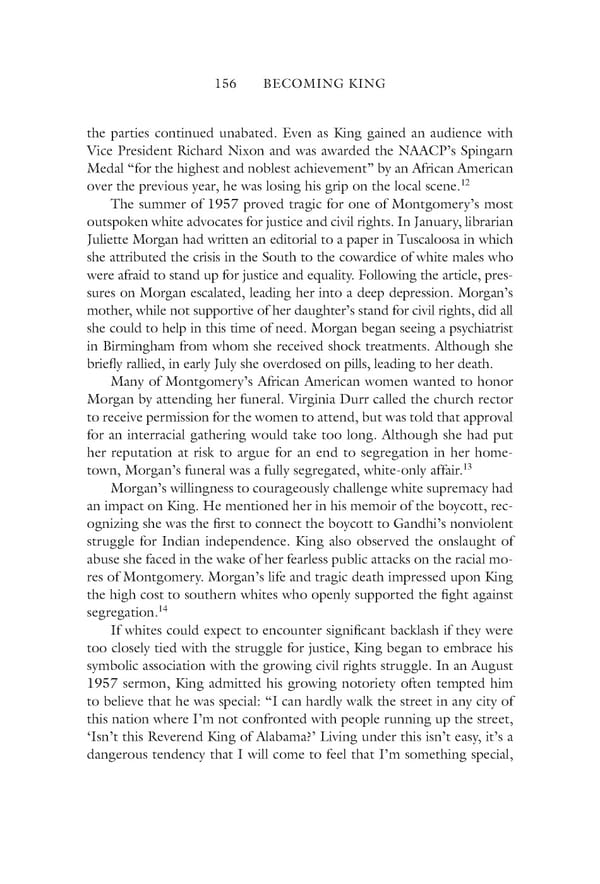156 BECOMING KING the parties continued unabated. Even as King gained an audience with Vice President Richard Nixon and was awarded the NAACP’s Spingarn Medal “for the highest and noblest achievement” by an African American 12 over the previous year, he was losing his grip on the local scene. The summer of 1957 proved tragic for one of Montgomery’s most outspoken white advocates for justice and civil rights. In January, librarian Juliette Morgan had written an editorial to a paper in Tuscaloosa in which she attributed the crisis in the South to the cowardice of white males who were afraid to stand up for justice and equality. Following the article, pres- sures on Morgan escalated, leading her into a deep depression. Morgan’s mother, while not supportive of her daughter’s stand for civil rights, did all she could to help in this time of need. Morgan began seeing a psychiatrist in Birmingham from whom she received shock treatments. Although she briefly rallied, in early July she overdosed on pills, leading to her death. Many of Montgomery’s African American women wanted to honor Morgan by attending her funeral. Virginia Durr called the church rector to receive permission for the women to attend, but was told that approval for an interracial gathering would take too long. Although she had put her reputation at risk to argue for an end to segregation in her home- 13 town, Morgan’s funeral was a fully segregated, white-only affair. Morgan’s willingness to courageously challenge white supremacy had an impact on King. He mentioned her in his memoir of the boycott, rec- ognizing she was the first to connect the boycott to Gandhi’s nonviolent struggle for Indian independence. King also observed the onslaught of abuse she faced in the wake of her fearless public attacks on the racial mo- res of Montgomery. Morgan’s life and tragic death impressed upon King the high cost to southern whites who openly supported the fight against 14 segregation. If whites could expect to encounter significant backlash if they were too closely tied with the struggle for justice, King began to embrace his symbolic association with the growing civil rights struggle. In an August 1957 sermon, King admitted his growing notoriety often tempted him to believe that he was special: “I can hardly walk the street in any city of this nation where I’m not confronted with people running up the street, ‘Isn’t this Reverend King of Alabama?’ Living under this isn’t easy, it’s a dangerous tendency that I will come to feel that I’m something special,
 Becoming King: Martin Luther King Jr. Page 176 Page 178
Becoming King: Martin Luther King Jr. Page 176 Page 178